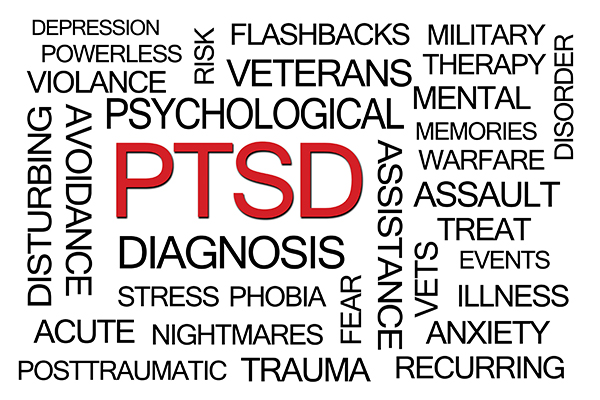
The Face of PTSD
At least you’re not one of those ‘crazy veterans’!!
Believe it or not this was not the first or last time I heard a statement like this. One time a primary care doctor was reviewing my file and said, “you are pretty high-functioning considering”. Considering what doc? Because I have been diagnosed with PTSD I should present differently? Does the fact I have a trauma history mean I should not find a way to regain control of my life?
PTSD is a real thing. It is something that affects many but NOT all our fellow veterans.
It is important we dispel some of the myths around PTSD ….and learn some basics of PTSD.
So, what is PTSD? Post-Traumatic Stress Disorder can occur after you have been through a traumatic event. A traumatic event is something terrible that you see, hear or happens to you.
These can include combat exposure, terrorist attack, abuse of any kind, serious accidents, natural disasters and others.

PTSD can affect anyone who:
• Directly experiences the traumatic event
• Witnesses a traumatic event
• Experiences firsthand repeated or extreme exposure to adverse details of traumatic event (usually in the course of professional duties); (first responders, professionals repeatedly exposed to details of trauma/abuse).
Common symptoms of PTSD:
Symptoms can occur immediately after the trauma or in others it may cause symptoms years after the event/trauma.
• Repeatedly thinking about the trauma. (Can manifest
as nightmares or flashbacks)
• Feeling on alert, on guard, easily startled or angered.
Feeling irritable, anxious or pre-occupied with feeling
unsafe are common.
• Difficulty sleeping or concentrating.
• Feelings of mistrust.
• Problems functioning at school, job, or social
situations.
• Feelings of intense fear: panic attacks.• Relationship
challenges: Problems with intimacy, feeling detached
from loved ones.
• Physical symptoms such as digestive problems, rapid
breathing, muscle tension and rapid heart rate.
It is important for anyone experiencing these symptoms to seek treatment. There are many amazing resources out there for our veterans to seek the help they need. It is important for family members, friends and loved ones to be supportive and encouraging of our fellow veterans as they work through the struggles of PTSD.
PTSD does not go away we simple learn how to manage our symptoms. We learn what a new normal is and how we can find happiness again.
What can a family member or loved one do to support their veteran who is struggling from PTSD?
• Encourage them to seek treatment ….in whatever
what works for them.
• Be willing to listen and understand they may not want
to talk.
• Encourage pro-social involvement (exercise clubs,
hobby groups, religious organizations)
• Offer to go to doctor; help track medications or other
support as needed.
• Learn more about PTSD. The more you know the
better you can support your loved one.
What can a family member or loved one do to support their veteran who is struggling from PTSD?
• Encourage them to seek treatment ….in whatever what
works for them.
• Be willing to listen and understand they may not want
to talk.
• Encourage pro-social involvement (exercise clubs,
hobby groups, religious organizations)
• Offer to go to doctor; help track medications or other
support as needed.
• Learn more about PTSD. The more you know the
better you can support your loved one.
What not to do:
• Ask a veteran how many people he/she killed.
• Try to fix them.
• Judge
• Assume you know what they are going through
• Tell them to ‘get over it’.
• Tell them it is in their head.
• Take your veteran’s anger or other feelings personally.
• Ask for specifics to their combat experience.
PTSD is a real struggle many of our returning veterans face every day. There are many resources that can help our veterans inside the VA and outside the VA. The first step to dealing with the struggles of PTSD is to seek help.
If you or someone you know is having suicidal thoughts, please call the Veteran’s Access and Crisis line at: 1 800 273 8255.


Connect with the Veterans Crisis Line to reach caring, qualified responders with the Department of Veteran Affairs (many are veterans themselves).
Please tune in next month as we discuss Traumatic Brain Injury (TBI) and some helpful tools to deal with it.
By RanDee McLain, LCSW
A Different Lens
Mental Health Monthly
Homeland Magazine – San Diego Veterans Magazine




